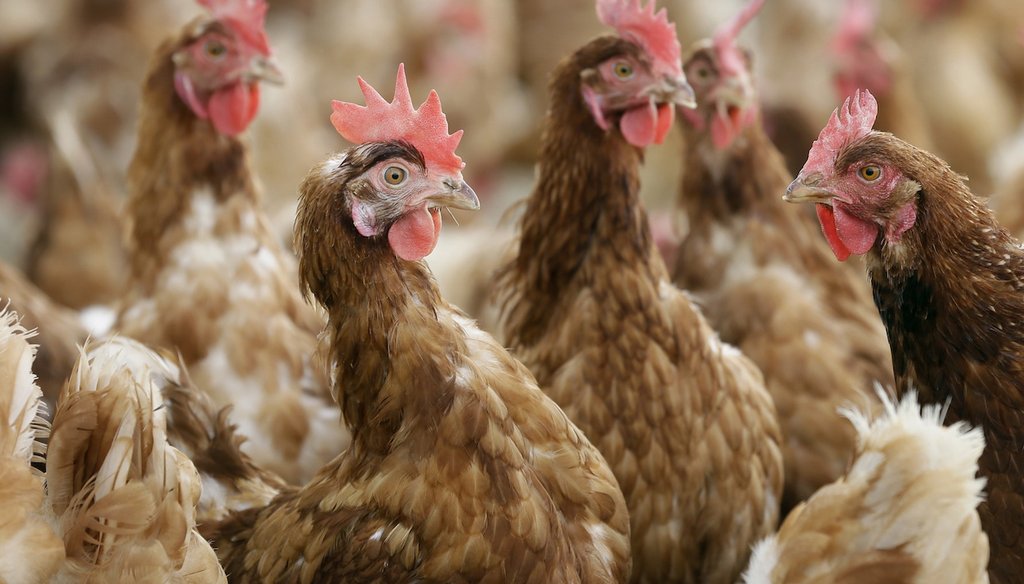

Our only agenda is to publish the truth so you can be an informed participant in democracy.
We need your help.


Cage-free chickens stand in a farm near Waukon, Iowa on Oct. 21, 2015. (AP)
Hormones occur naturally in all organisms.
Estrogen in large quantities can adversely affect health, but there is not nearly enough estrogen in chicken and beef to cause harm, an endocrinologist said.
Learn more about PolitiFact’s fact-checking process and rating system.
Could the amount of estrogen in beef and chicken lead men to bald, develop enlarged breast tissue and curtail muscle development? The answer is no, despite popular misconceptions online.
An Instagram reel features Bobby Price, a nutritionist who sells weight loss teas, which are found to be ineffective and in some cases, dangerous because they contain senna, a natural laxative that is not meant to be consumed daily.
Price says that chickens and cows have large amounts of natural and synthetic hormones that can cause unwanted side effects in men who consume them.
"When you eat the chicken and you eat the cow, you eat the hormones," he said in a reel shared Feb. 26. "And the unfortunate thing is, the more and more you eat of that, it raises the estrogen levels in the body. And this is why you’re seeing so many men who struggle with building muscle mass, so many men who are developing what are called ‘man boobs,’ gynaecomastia. And then, so many men who are balding."
This post was flagged as part of Meta’s efforts to combat false news and misinformation on its News Feed. (Read more about our partnership with Meta, which owns Facebook and Instagram.)
The amount of estrogen in meats is small and regulated by the U.S. Food and Drug Administration.
"(It’s) not possible to eat enough chicken and/or beef (thousands of pounds), to get remotely close to causing any of the above adverse effects," said Dr. Bradley Anawalt, an endocrinologist and medicine professor at the University of Washington.
He told PolitiFact by email that it would take at least 100 micrograms or more of daily estradiol intake, the most potent form of estrogen, to affect a man. He said chicken and beef typically have less than 0.005 micrograms of estrogen per 100 grams of meat, and 1 pound of chicken or beef has about 0.025 micrograms of estrogen.
Anawalt added that excess estrogen, which could be caused by factors including medications, drinking too much alcohol or having too much stress, could lead to gynecomastia, or the enlargement of male breast tissue, and deter muscle mass growth by suppressing blood testosterone below normal levels. He said estrogen does not cause balding. That’s caused by heredity and excessive stress.
Anawalt pointed to a study published in the Toxicology Research and Application journal that found there is no evidence that the hormone content in typical serving sizes of common foods harms health.
A Michigan State University Extension article written by Jared Jaborek, who earned a doctorate in animal sciences, shows beef has a low concentration of hormones when compared with vegetables, eggs and milk. The article adds that all organisms contain naturally occurring hormones.
Some cows in the U.S. are given synthetic hormones to promote growth, wrote Amanda Blair, an animal science professor at South Dakota State University.Those hormones are typically delivered through an implant on the animal’s ear that releases hormones over a period of time, not injected into the animal, as the video claimed.
But the FDA monitors and regulates those additional hormones to ensure products are safe to eat. And the FDA forbids the use of steroid hormones in poultry farming.
We rate the claim that the high levels of estrogen in chicken and cows lead men who eat them to bald, develop man boobs and be unable to grow muscle mass False.
Instagram post (archived), Feb. 26, 2024
Email interview with Dr. Bradley Anawalt, endocrinologist and professor of medicine at the University of Washington, Feb. 28, 2024
Research Gate, Naturally occurring hormones in foods and potential health effects, June 2020
Michigan State University, There’s hormones in beef? MSU Extension addresses common misconceptions, Oct. 13, 2023
South Dakota State University Extension, Hormones in Beef: Myths vs. Facts, July, 13, 2022
U.S. Department of Agriculture, Chicken from Farm to Table, Nov. 14, 2019
Cleveland Clinic, High Estrogen, Feb. 9, 2022
Business Insider, The ‘weight loss’ teas you’ve seen on Instagram are a scam, but there are teas with appetite-curbing benefits, Nov. 6, 2019
Medical News Today, Slimming tea: Does it work and is it bad for you?, Sep. 14, 2017
University of Pennsylvania Medicine, Hair loss (Alopecia), accessed March 1, 2024
In a world of wild talk and fake news, help us stand up for the facts.
